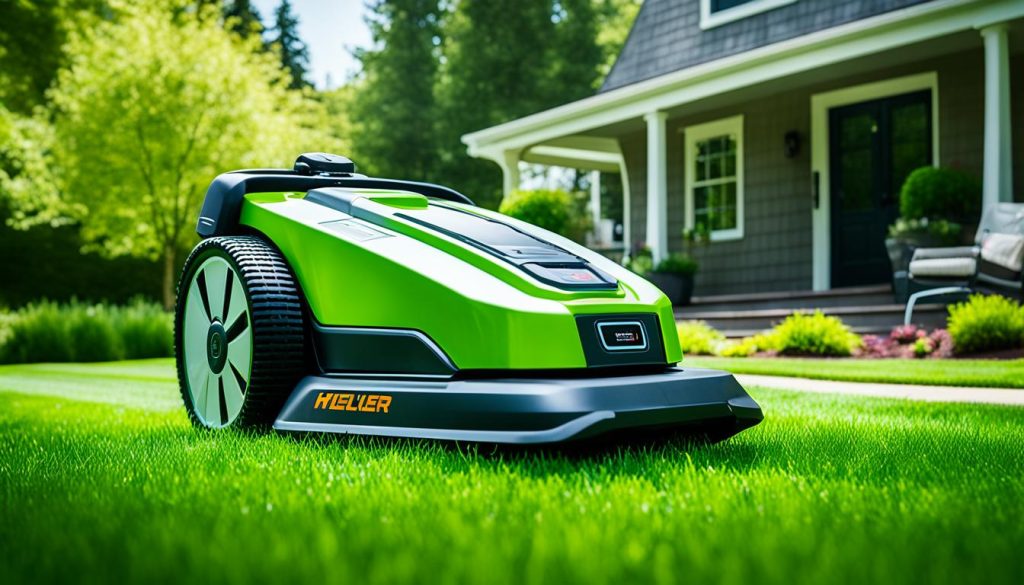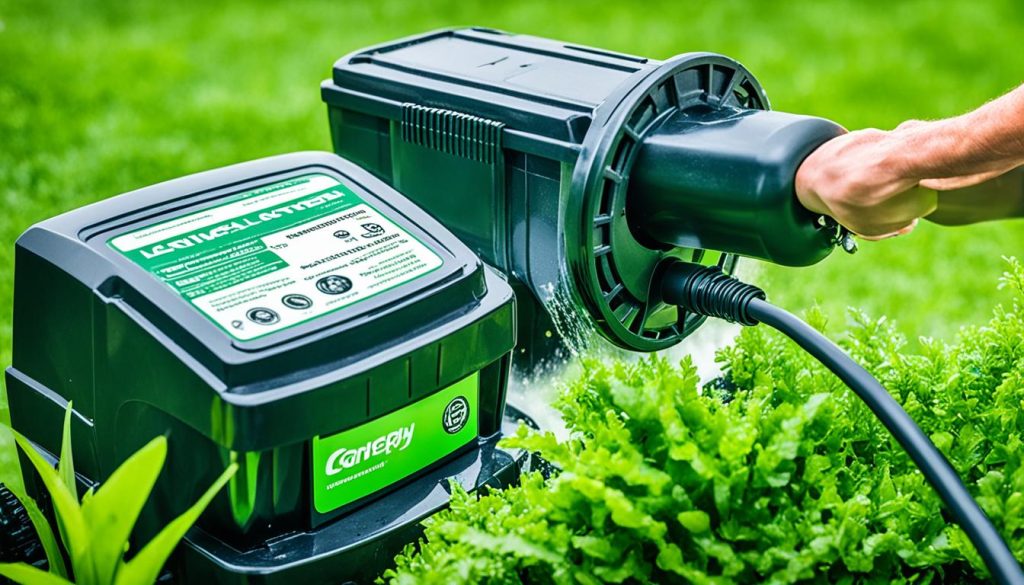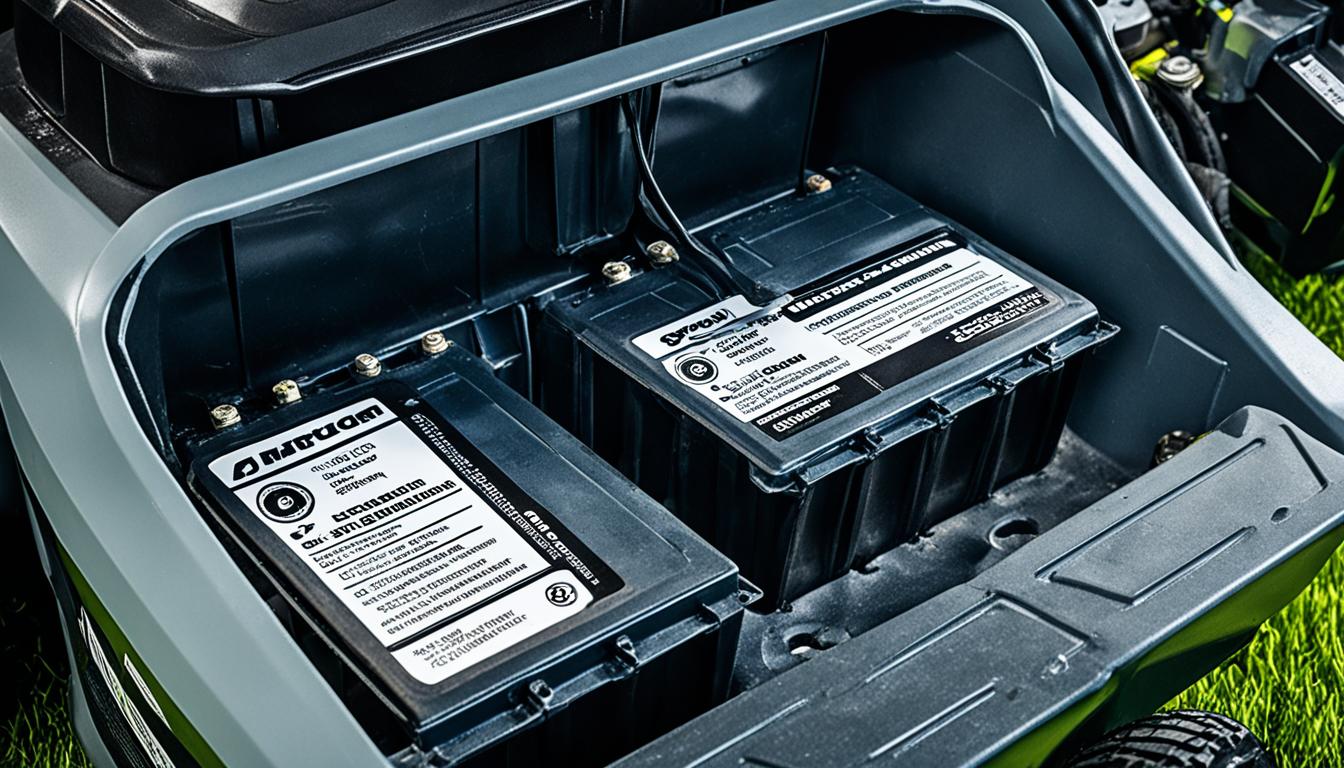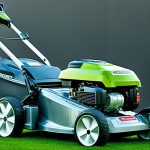Have you ever experienced the frustration of a lawn mower battery dying halfway through a job? It can be incredibly inconvenient and disrupt your gardening plans. But just how long does a lawn mower battery last? Is there a way to extend its lifespan for optimal performance?
In this article, we will explore the average lifespan of a lawn mower battery and provide tips on how to extend its longevity. Discover the key factors that affect battery life and learn how to make the most out of your battery-powered gardening tool. Are you ready to dive in?
Key Takeaways:
- Understanding the average lifespan of a lawn mower battery can help you plan and budget for replacements.
- Taking proper care of your battery can significantly extend its longevity.
- Different types of lawn mower batteries have varying lifespans and maintenance requirements.
- Choosing the right battery for your mower is essential for optimal performance and longevity.
- Maximizing battery life requires following specific charging and storage practices.
Ways to Power a Lawn Mower
When it comes to powering a lawn mower, there are several options available. Whether you prefer the tried-and-true gasoline engines or the convenience of battery power, each option has its advantages and considerations. Let’s explore the different ways you can power your lawn mower.
Gasoline-Powered Mowers
Gasoline-powered mowers have long been the go-to choice for homeowners and professionals alike. These mowers are typically equipped with internal combustion engines that run on gasoline. They offer power, durability, and the ability to handle larger lawn areas. However, they require regular maintenance, including fueling with gasoline and oil, and can be noisy and emit exhaust fumes.
Battery-Powered Mowers
Battery-powered mowers are gaining popularity due to their convenience and environmental benefits. These mowers are powered by rechargeable batteries and offer a quieter operation, zero emissions, and easy start-up. Battery mowers are generally lightweight and maneuverable, making them ideal for smaller yards. However, their run time may be limited, and they require periodic recharging.
Corded Electric Mowers
Corded electric mowers are another option for powering your lawn mower. These mowers require an external power source, typically an electrical outlet, to operate. Corded electric mowers offer continuous power without the need for recharging or refueling. However, the use of an extension cord limits the range and mobility of the mower, and the cord can be a potential tripping hazard.
Gasoline-Electric Combination Mowers
For those seeking the best of both worlds, some mowers offer a combination of gasoline and electric power. These mowers feature a gas-powered engine that drives the blades, along with an electric motor powered by a battery or an onboard generator. This hybrid design provides the convenience of battery power for starting and maneuvering while offering the extended run time and cutting capability of a gas engine.
In summary, there are several ways to power a lawn mower, including gasoline, battery power, corded electric, and gas/electric combination mowers. Each option has its advantages and considerations in terms of power, convenience, emissions, noise, maintenance, and practicality for different lawn sizes and user preferences.
| Power Option | Advantages | Considerations |
|---|---|---|
| Gasoline-Powered Mowers | Powerful and durable | Regular maintenance, noise, emissions |
| Battery-Powered Mowers | Convenience, environmental benefits | Limited run time, periodic recharging |
| Corded Electric Mowers | Continuous power | Range limitations, cord management |
| Gasoline-Electric Combination Mowers | Mix of power and convenience | Complex design, maintenance |
Gasoline-powered Mowers
Gasoline-powered mowers have been the go-to choice for many homeowners due to their long-standing reliability and widespread availability. However, they do come with a few disadvantages that should be taken into consideration.
Disadvantages of Gasoline-powered Mowers:
- The need for gas and oil: Gas-powered mowers require the user to have gasoline and oil on hand for operation. This means making sure you have enough fuel and the correct oil mixture before each use.
- Pull string start: Unlike some other types of mowers that feature electric starts, gas-powered mowers require the use of a pull string to start their engines. This manual starting process may pose challenges for individuals with limited strength or agility.
- Maintenance requirements: Gasoline-powered mowers need regular maintenance to ensure optimal performance. This includes regular oil changes, cleaning or replacing air filters, and spark plug replacements.
While gas-powered mowers have their drawbacks, they continue to be a popular choice due to their power, durability, and ability to tackle large yards efficiently. Manufacturers are continuously improving their designs, resulting in better performance, reduced emissions, and quieter operation.
It’s worth considering these disadvantages alongside the benefits and weighing them against your specific preferences and needs.
Comparing Gasoline-powered Mowers with Other Types of Lawn Mowers:
| Factors | Gasoline-powered Mowers | Battery-powered Mowers | Corded Electric Mowers |
|---|---|---|---|
| Power Source | Gasoline | Rechargeable Battery | Electricity (corded) |
| Advantages |
|
|
|
| Disadvantages |
|
|
|
Corded Electric Mowers
Corded electric mowers offer a convenient option for homeowners with small yards. These mowers provide several benefits, including the elimination of the need for gas and oil, as well as easy startup. By simply plugging the mower into an outlet, users can quickly begin their mowing tasks without the hassle of fuel or engine maintenance.
However, it is important to note that using corded electric mowers does come with some frustrations. The primary challenge is the reliance on extension cords to power the mower. While this setup may be suitable for smaller yards, it becomes increasingly cumbersome as the size of the lawn expands.
Extension cords can become unplugged during operation, causing interruptions and requiring manual reconnection. Additionally, these cords can get tangled, caught in yard items, or become obstacles that limit the range and maneuverability of the mower.
To overcome these challenges, proper cord management techniques and strategic placement of outlets are essential. Planning the mowing route in advance and securing the extension cord to prevent accidental disconnection can help minimize frustrations.
| Pros | Cons |
|---|---|
| + Eliminates the need for gas and oil | – Reliance on extension cords |
| + Easy startup | – Extension cords can come unplugged |
| – Extension cords can get caught in yard items | |
| – Extension cords limit the range and maneuverability |
Battery-powered Mowers
Battery-powered mowers have become increasingly popular among homeowners due to their numerous advantages. One of the biggest advantages is the freedom from trips to the gas station and the hassle of dealing with spills. With a battery-powered mower, you can simply charge the battery at home and start cutting your grass without any interruptions.
Not only do battery-powered mowers eliminate the inconvenience of trips to the gas station, but they also help reduce the environmental impact. Unlike gas mowers that release emissions and contribute to air pollution, battery-powered mowers produce zero emissions, making them a cleaner and greener choice for your lawn care routine.
However, when it comes to battery-powered mowers, it’s crucial to choose the right battery to ensure optimal performance and longevity. The quality and capacity of the battery can directly impact how long the mower can run on a single charge. Additionally, the battery’s level of durability and resistance to external factors such as temperature changes can affect its overall lifespan.
When selecting a battery for your mower, consider factors such as voltage, amp-hour (Ah) rating, and battery chemistry. Lithium-ion batteries are a popular choice for their high energy density, longer lifespan, and lightweight design. These batteries provide consistent power and can last for many seasons with proper care.
It’s also worth mentioning that battery-powered mowers have improved significantly in recent years. They now offer comparable cutting performance to their gas-powered counterparts while providing the added convenience of push-button start and quieter operation.
To help you understand the advantages of battery-powered mowers more clearly, take a look at the following comparison:
| Advantages of Battery-powered Mowers | Advantages of Gas-powered Mowers |
|---|---|
|
|

As you can see, battery-powered mowers offer a range of advantages, including the elimination of trips to the gas station and the prevention of spills. These mowers are also more environmentally friendly, with zero emissions during operation. However, it’s essential to choose the right battery for your mower to ensure optimal performance and longevity.
Gas-powered Mowers with Electric Start
For those with larger properties or lawncare businesses, gas-powered mowers with electric start can be the best option. Instead of using a pull string, these mowers have a battery-powered starter that can be activated with a button or key.
Gas-powered mowers with electric start combine the best of both worlds by providing the convenience of an electric start system with the power and reliability of a gas engine. With a starter battery, users can start their mower effortlessly, eliminating the need for physical exertion and simplifying the operation process.
In addition to an electric start, gas-powered mowers offer the advantage of being able to handle large properties or commercial lawncare needs. These mowers typically have a robust engine that can tackle tough terrain and thick grass with ease, providing a clean and efficient cut.
Furthermore, gas-powered mowers with electric start are known for their durability and longevity. The combination of a reliable gas engine and the convenience of an electric starter ensures that these mowers are built to withstand heavy-duty use and extended cutting sessions.
Comparison: Gas-powered Mowers with Electric Start vs. Traditional Pull-start Mowers
| Features | Gas-powered Mowers with Electric Start | Traditional Pull-start Mowers |
|---|---|---|
| Starting Mechanism | Battery-powered starter | Pull string |
| Convenience | Effortless push-button or key start | Requires physical exertion to pull-start |
| Power | Reliable gas engine | Reliable gas engine |
| Usability | Efficiently handles large properties or commercial lawncare needs | Primarily suitable for smaller residential lawns |
| Durability | Built to withstand heavy-duty use | Suitable for regular residential use |
As shown in the comparison table above, gas-powered mowers with electric start provide the convenience of an electric starter while maintaining the power and durability of a traditional gas mower. This combination makes them an excellent choice for individuals or businesses that require a mower capable of handling demanding tasks.
How Long Do Lawn Mower Batteries Last?
The lifespan of a lawn mower battery depends on the type of battery it is. Lead-acid batteries, although cheaper, are heavier, require more maintenance, and have a shorter lifespan. On the other hand, lithium LiFePO4 batteries are more expensive upfront but last 4-6 times longer, require no maintenance, and can last for 10+ years or 3,000 charging cycles.
If you’re choosing a lawn mower battery, it’s important to consider the long-term costs and convenience. While lead-acid batteries may seem cost-effective initially, you’ll need to invest in replacements more frequently. On the other hand, lithium batteries will last longer without additional maintenance or replacements, potentially saving you money in the long run.
With lead-acid batteries, you’ll need to ensure proper maintenance to extend their lifespan. Regularly checking the battery’s water levels, avoiding deep discharges, and properly charging it after each use will help maximize its longevity.
However, if you opt for lithium LiFePO4 batteries, you can enjoy a longer lifespan without the hassle of maintenance. These batteries have a higher number of charging cycles, meaning they can be charged and discharged more times before their performance starts to decline. Additionally, they have a higher energy density, which allows them to hold a charge for longer periods.
It’s worth noting that the lifespan of any battery can be influenced by factors such as usage frequency, charging practices, and storage conditions. By following the manufacturer’s recommendations and best practices, you can ensure you get the most out of your lawn mower battery.
If you’re looking for a battery that offers longevity, reliability, and low maintenance, lithium LiFePO4 batteries are a great investment. Although they may have a higher upfront cost, their extended lifespan, improved performance, and convenience make them a wise choice for long-term use.
Advantages of Lithium Lawn Mower Batteries
Lithium lawn mower batteries offer numerous advantages over lead-acid batteries, making them an excellent choice for efficient and reliable power. These innovative batteries come with a range of features and benefits that enhance the performance and convenience of lawn mowers.
- Built-in Battery Management System: Lithium lawn mower batteries are equipped with a built-in battery management system, which optimizes their operation, monitors their performance, and prevents issues such as overcharging or over-discharging.
- Lower Discharge Rate: Compared to lead-acid batteries, lithium batteries have a lower discharge rate. This means they can hold their charge for longer periods, allowing you to tackle larger mowing jobs without worrying about battery depletion.
- Faster Charge Rate: Lithium batteries have a faster charge rate compared to traditional lead-acid batteries. This means you can spend less time waiting for the battery to recharge and more time getting the job done.
- Non-Toxic: Unlike lead-acid batteries, lithium batteries are non-toxic and do not contain harmful materials such as lead or acid. This makes them safer for both the environment and the user.
- Resilient to Extreme Temperatures: Lithium batteries are more resilient to extreme temperatures, both hot and cold, compared to lead-acid batteries. This allows them to perform optimally in a variety of weather conditions.
- Emergency Start Function: Many lithium lawn mower batteries come with an emergency start function. This feature allows you to jump-start your mower using the battery’s power, providing peace of mind in case of unexpected starting issues.
- Lighter Weight: Lithium batteries are significantly lighter compared to lead-acid batteries. This makes them easier to handle and install in the mower, reducing the strain on the user.
Overall, lithium lawn mower batteries offer a range of advantages that enhance their performance, convenience, and environmental friendliness. With their built-in management system, lower discharge rate, faster charge rate, non-toxic composition, resilience to extreme temperatures, emergency start function, and lighter weight, they are a reliable and efficient power source for your lawn care needs.
Lifespan and Replacement of Lawn Mower Batteries
The lifespan of a lawn mower battery can vary depending on various factors, including maintenance, usage, and storage practices. It is important to understand these factors to ensure that you get the most out of your battery and know when it is time for a replacement.
Factors Affecting Battery Life
Several factors can affect the lifespan of a lawn mower battery:
- Maintenance: Proper maintenance, such as regular cleaning and inspection of battery terminals, can help extend the life of your battery.
- Usage: The frequency and duration of use directly impact battery life. Using your lawn mower for extended periods without giving the battery time to rest can shorten its lifespan.
- Storage: Storing the battery in extreme temperatures or without proper protection can expedite its deterioration.
Types of Batteries and Their Lifespan
There are two common types of lawn mower batteries: lead-acid batteries and lithium-ion batteries. The lifespan of these batteries differs:
| Battery Type | Lifespan |
|---|---|
| Lead-Acid Batteries | Approximately three years |
| Lithium-Ion Batteries | Three to five years or longer with proper care |
Lead-acid batteries are typically cheaper but require more maintenance. They are heavier and may need periodic fluid checks and top-ups. Conversely, lithium-ion batteries are more expensive upfront but offer a longer lifespan and require minimal maintenance.
Replacement Recommendations
To ensure optimal performance, it is recommended to replace your lawn mower battery when it reaches the end of its lifespan. For lead-acid batteries, this generally occurs around the three-year mark. As for lithium-ion batteries, replacement is typically recommended after four years. It is essential to follow the manufacturer’s guidelines for the specific battery model you have.
By replacing your battery at the appropriate time, you can avoid sudden failures and experience consistent performance from your lawn mower.
Cost of Lawn Mower Batteries
When it comes to the cost of lawn mower batteries, there are a few factors to consider. The type of battery you choose can have a significant impact on both the upfront cost and long-term maintenance expenses.
Let’s take a look at two common types of lawn mower batteries: lead-acid batteries and lithium-ion batteries.
- Lead-Acid Batteries: Lead-acid batteries are generally cheaper compared to their lithium-ion counterparts. However, they require more maintenance and have a shorter lifespan. The price range for lead-acid batteries typically falls between $19 and $73.
- Lithium-Ion Batteries: Lithium-ion batteries, on the other hand, come with a higher upfront cost. However, they offer several advantages, including longer lifespan, no maintenance requirements, and a higher number of charge/discharge cycles. The cost of lithium-ion batteries starts from around $75 and can go up to $300-400.
While lead-acid batteries may seem more affordable initially, keep in mind that their shorter lifespan and maintenance requirements might result in additional expenses in the long run. On the other hand, investing in a lithium-ion battery can provide you with a durable and hassle-free power source for your lawn mower.
Tips for Prolonging Lawn Mower Battery Life
To maximize the lifespan of your lawn mower battery, it is essential to follow a few key tips and practices. By taking proper care of your battery, you can ensure long-lasting performance and avoid frequent replacements. Here are some tips for prolonging the life of your lawn mower battery:
Fully Charge the Battery upon First Use
When you first get your lawn mower, it is crucial to fully charge the battery before using it. This initial charge helps condition the battery and prepare it for optimal performance. Refer to your lawn mower’s user manual for specific instructions on charging the battery.
Avoid Frequent Charging
While it may be tempting to charge your lawn mower battery whenever it is not in use, it is best to avoid frequent charging. Lithium-ion batteries should be charged when they reach around 10-20% charge remaining. On the other hand, lead-acid batteries should not be discharged below 50%. By following these guidelines, you can prevent overcharging and premature wear of the battery.
Proper Storage is Key
When it comes to storing your lawn mower battery, it is essential to do so correctly. Storing the battery at around 40-50% charge is ideal. Additionally, keep the battery in a cool and dry environment to prevent damage from extreme temperatures or moisture. Following these storage practices can help extend the overall lifespan of your battery.
| Tip | Benefit |
|---|---|
| Fully charge the battery upon first use | Conditions the battery for optimal performance |
| Avoid frequent charging | Prevents overcharging and premature wear |
| Store at 40-50% charge in a cool environment | Extends the overall lifespan of the battery |
By following these tips for prolonging lawn mower battery life, you can ensure that your battery performs at its best and lasts longer. Taking care of your battery will not only save you money on frequent replacements but also keep your lawn mower running smoothly for years to come.

Myth vs. Reality: Gas vs. Battery Mowers
When it comes to choosing a lawn mower, there are often debates about the pros and cons of gas-powered mowers versus battery-powered mowers. Let’s examine some common myths and realities surrounding these two types of mowers.
Gas Mowers
Myth: Gas mowers provide better cut quality than battery mowers.
Reality: Gas mowers do offer improved cut quality, especially when dealing with tough or damp grass. The powerful engines and sharp blades of gas mowers allow for a clean and precise cut, leaving your lawn looking pristine.
Myth: Gas mowers are more powerful than battery mowers.
Reality: Gas mowers do have a reputation for being more powerful due to their robust engines. This extra power can come in handy when mowing through thick or overgrown grass, providing a cleaner and quicker cut.
Myth: Gas mowers require less maintenance compared to battery mowers.
Reality: Gas mowers are generally easier to maintain. They require basic maintenance tasks like oil changes and spark plug replacements. Additionally, gas mowers have fewer parts to service compared to battery mowers, making maintenance simpler and more accessible.
Myth: Gas mowers have a higher environmental impact than battery mowers.
Reality: While gas mowers do emit some pollutants, advancements in engine technology have significantly reduced emissions and noise pollution. Gas mowers are now more eco-friendly than ever before, making them a more sustainable choice for environmentally conscious gardeners.
Battery Mowers
Myth: Battery mowers have inferior cut quality to gas mowers.
Reality: Battery mowers have made significant advancements in recent years, and the cut quality they provide is comparable to that of gas mowers. With sharp blades and efficient motors, battery mowers deliver a clean and precise cut, ensuring a well-groomed lawn.
Myth: Battery mowers lack power for demanding mowing tasks.
Reality: Battery mowers are designed with sufficient power to handle most residential mowing needs. While they may not have the same level of raw power as gas mowers, they can still effectively cut through typical grass heights found in residential settings.
Myth: Battery mowers require frequent recharging, limiting their usefulness.
Reality: While it’s true that battery mowers have limited run times, the majority of them offer enough battery life to mow an average-sized yard on a single charge. Additionally, many models now feature quick-charging capabilities, allowing for shorter charging times and extended usage.
Myth: Battery mowers are more expensive upfront compared to gas mowers.
Reality: Battery mowers do have a higher initial cost than gas mowers due to the price of the battery and charger. However, when considering long-term maintenance costs and the price of fuel for gas mowers, battery mowers often prove to be a more cost-effective option in the long run.
Overall, both gas and battery mowers have their unique advantages and considerations. The choice between the two ultimately depends on individual preferences, lawn size, and specific gardening needs. It’s essential to assess factors such as cut quality, power, maintenance requirements, and the environmental impact when making a decision.
Summary:
In summary, gas mowers are known for their superior cut quality, power, ease of maintenance, and reduced emissions. Battery mowers, on the other hand, offer convenience, eco-friendliness, and comparable cut quality. It’s crucial to weigh these factors and choose the mower that best aligns with your needs and priorities.
The Power of Gas-Powered Mowers
Gas-powered mowers are known for delivering a superior cut quality, thanks to the advancements in blade design. Whether you’re dealing with tough, dense grass or damp conditions, gas mowers are renowned for their ability to provide a precise and even cut, leaving your lawn looking impeccable.
But it’s not just about the cut quality; gas-powered mowers are also highly durable, with engines that can last 10 years or more when properly maintained. These machines are built to withstand rigorous use and challenging terrain, making them a reliable choice for long-term lawn maintenance.
Advances in technology have further improved the experience of using gas-powered mowers. One notable development is the elimination of time-consuming oil changes. With the introduction of innovative engine designs and self-lubricating components, maintaining a gas mower has become more convenient than ever.
Gas mowers also offer other conveniences that make them a preferred choice for many homeowners. They feature a convenient start mechanism, often through a simple pull of a cord or push of a button, allowing for hassle-free operation. Additionally, gas mowers provide easy storage options, requiring minimal space in your garage or shed.
Besides their performance benefits, gas-powered mowers have also made strides in reducing their environmental impact. With advancements in emission control technology, modern gas mowers produce lower emissions compared to older models. This means cleaner air and a smaller carbon footprint during lawn care activities.
Moreover, gas mowers have become quieter in operation, resulting in a more pleasant experience for both the operator and nearby residents. Recent innovations in engine design and muffler technology have significantly reduced noise levels, making gas mowers more neighbor-friendly.
Gas-powered mowers combine superior cut quality, durability, and advances in technology to provide a reliable and efficient approach to lawn care. With the added benefits of convenient starts, easy storage, lower emissions, and quieter operation, these mowers continue to be a popular choice among homeowners.
Considerations for Choosing the Best Mower
When it comes to choosing the best mower for your needs, there are several important factors to consider. These factors include cut quality, life expectancy, cost, and maintenance requirements. By carefully weighing these considerations, you can make an informed decision and select a mower that aligns with your preferences and gardening needs.
Gas mowers are known for their superior cut quality. With powerful engines and sharp blades, they can tackle even tough or damp grass with ease. Additionally, gas mowers generally have a longer life expectancy compared to other types of mowers.
On the other hand, battery-powered mowers offer a convenient and environmentally friendly option. They eliminate the need for gasoline, reducing emissions and eliminating the hassle of trips to the gas station. Battery mowers are also quieter during operation and are generally easier to maintain.
When considering cost, it’s important to weigh the upfront investment against long-term savings. While gas mowers may have a lower initial cost, they often require more maintenance and ongoing fuel expenses. Conversely, battery mowers may have a higher upfront cost but require minimal maintenance and offer potential savings in the long run.
Maintenance is another crucial factor to consider. Gas mowers typically require regular oil changes, spark plug replacements, and other maintenance tasks. Battery mowers, on the other hand, have fewer maintenance requirements and are generally easier to care for.
In summary, when choosing the best mower for your needs, it’s essential to consider factors such as cut quality, life expectancy, cost, and maintenance requirements. Gas mowers offer superior cut quality and longer life expectancy, while battery mowers are more convenient and environmentally friendly. By evaluating these considerations and prioritizing the features that matter most to you, you can find the perfect mower for a well-maintained and picturesque lawn.
Conclusion
In conclusion, the lifespan of a lawn mower battery is influenced by the type of battery used and its maintenance practices. Lithium-ion batteries tend to last longer and require less maintenance compared to lead-acid batteries. To ensure optimal battery life, it is crucial to follow proper charging and storage practices.
Gas-powered mowers have seen significant advancements, offering superior cut quality, durability, and convenience. They have become easier to maintain, eliminating the need for time-consuming oil changes. Additionally, gas mowers emit fewer pollutants and operate with reduced noise levels.
On the other hand, battery-powered mowers provide a more eco-friendly option, eliminating the need for gas and oil. However, they may have limitations in terms of run time and upfront cost. When choosing a mower, it is important to consider factors such as cut quality, life expectancy, cost, and maintenance requirements.
In summary, the choice between a gas-powered mower and a battery-powered mower depends on individual preferences and gardening needs. Both options have their advantages, and it’s essential to weigh the pros and cons before making a decision. Whether you prioritize cut quality, durability, convenience, or environmental impact, understanding the differences between these mowers will help you make an informed choice for your lawn care needs.





